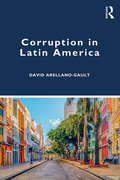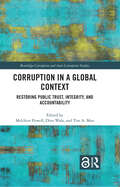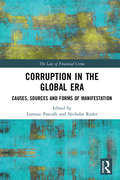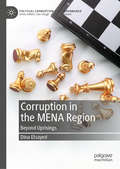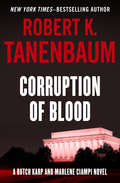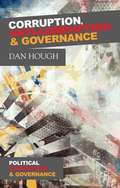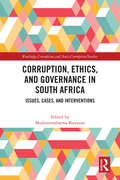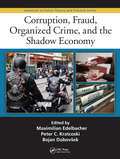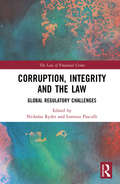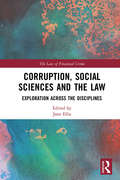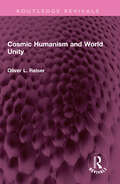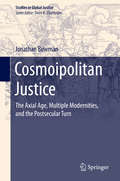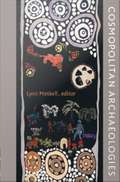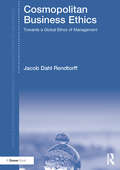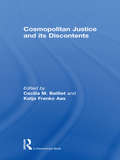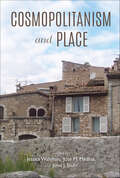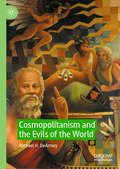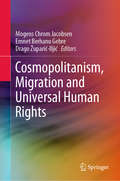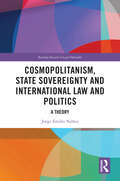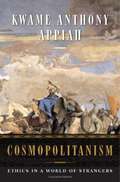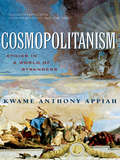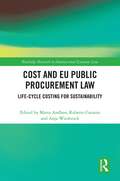- Table View
- List View
Corruption in Latin America
by David Arellano-GaultIn Corruption in Latin America the reader is presented with an alternative starting point for understanding corruption in this key region. The author asserts that corruption is a stable and rational social and organizational mechanism. Seen through this lens, we can begin to understand why it persists, and how to implement strategies to control corruption effectively. Beginning with an in-depth, nuanced examination of the concept of corruption, the author establishes the theoretical basis for viewing corruption as a social construct. An analysis of the experiences of four countries in the region – Argentina, Brazil, Guatemala and Mexico – provides the reader with concrete data from which they can understand how and why these behaviors are reproduced, validated, and tolerated in everyday settings between governments and citizens, governments and firms, and firms and clients. Once we see corruption as the socially sanctioned norm for getting business done, we can begin to produce and propose effective solutions to reduce corruption in Latin America by designing and implementing instruments that transform this dynamic. This rigorous and original approach will challenge the reader’s assumptions about corruption, and will appeal to students of corporate governance, international business, public management, and business ethics.
Corruption in a Global Context: Restoring Public Trust, Integrity, and Accountability (Routledge Corruption and Anti-Corruption Studies)
by Tim A. Mau Melchior Powell Dina WafaThis book provides an important survey of the causes and current state of corruption across a range of nations and regions. Delving into the diverse ways in which corruption is being combatted, the book explores and describes efforts to inculcate principles of ethical conduct in citizens, private sector actors and public sector personnel and institutions. Corruption is a global condition that effects every type of government, at every level, and has bewitched scholars of governance from ancient times to the present day. The book brings together chapters on a range of state and regional corruption experiences, framing them in terms of efforts to enhance ethical conduct and achieve integrity in government practices and operations. In addition, the book addresses and analyses the theoretical and practical bases of ethics that form the background and historical precepts of efforts to create integrity in government practices, and finally assesses recent international efforts to address corruption on an international scale. This book will be perfect for researchers and upper level students of public administration, comparative government, international development, criminal justice, and corruption.
Corruption in the Global Era: Causes, Sources and Forms of Manifestation (The Law of Financial Crime)
by Nicholas Ryder Lorenzo PasculliCorruption is a globalising phenomenon. Not only is it rapidly expanding globally but, more significantly, its causes, its means and forms of perpetration and its effects are more and more rooted in the many developments of globalisation. The Panama Papers, the FIFA scandals and the Petrobras case in Brazil are just a few examples of the rapid and alarming globalisation of corrupt practices in recent years. The lack of empirical evidence on corrupt schemes and a still imperfect dialogue between different disciplinary areas and between academic and practitioners hinder our knowledge of corruption as a global phenomenon and slow down the adoption of appropriate policy responses. Corruption in the Global Era seeks to establish an interdisciplinary dialogue between theory and practice and between different disciplines and to provide a better understanding of the multifaceted aspects of corruption as a global phenomenon. This book gathers top experts across various fields of both the academic and the professional world – including criminology, economics, finance, journalism, law, legal ethics and philosophy of law – to analyze the causes and the forms of manifestation of corruption in the global context and in various sectors (sports, health care, finance, the press etc.) from the most disparate perspectives. The theoretical frameworks elaborated by academics are here complemented by precious insider accounts on corruption in different areas, such as banking and finance and the press. The expanding links between corrupt practices and other global crimes, such as money laundering, fraud and human trafficking, are also explored. This book is an important resource to researchers, academics and students in the fields of law, criminology, sociology, economics and ethics, as well as professionals, particularly solicitors, barristers, businessmen and public servants.
Corruption in the MENA Region: Beyond Uprisings (Political Corruption and Governance)
by Dina ElsayedThis book explores the causes of corruption in the Middle East and North Africa through a systematic cross-national comparative analysis of fifteen countries in the region. It aims to explain causal relationships between corruption and differences in political and socio-economic dimensions within these different countries over the period 1999-2010. The countries are grouped together into three sub-regions (the Gulf region, North Africa, and Mashreq plus Yemen). The author finds that the main variables that showed robustness in impacting the intensity of corruption are the rule of law, quality of regulations, and trade openness. Poverty rates and income inequality have been clear triggers for petty corruption. Meanwhile, natural resources endowments have shown less of an impact on the levels of corruption, and similarly women's empowerment has not been found to be a strong indicator.
Corruption of Blood: Corruption Of Blood, Falsely Accused, Irresistible Impulse, And Reckless Endangerment (Butch Karp and Marlene Ciampi #7)
by Robert K. TanenbaumA prosecutor goes after the truth about JFK&’s assassination in a New York Times–bestselling author&’s &“most enthralling legal thriller to date&” (Vincent Bugliosi). In a forgotten corner of the Georgetown library, New York prosecutor Butch Karp is about to commit a felony. He cracks the seal on a government file, in which he finds papers, a ledger, a reel of film, and a small jar that holds a chunk of human flesh. Just by looking at this material, he has broken the law. It&’s the evidence he needs to prove the true identity of the man who killed Kennedy, and now that he has it, Karp is the most dangerous man in America. Brought to Washington to assist in the Congressional investigation into Kennedy&’s death, Karp was expected to toe the line. As his personal inquiries lead him into a web that stretches from the capos of the mafia to the halls of the Kremlin, this hard-driving attorney realizes the conspiracy that killed Kennedy is still alive—and out for blood. As deputy chief counsel to the 1976 House Select Committee on Assassinations, Robert K. Tanenbaum has an insider&’s understanding of one of the darkest days in American history. Corruption of Blood is a novel inspired by real events by an author who &“knows his criminal procedure cold&” (Publishers Weekly). This ebook features an illustrated biography of Robert K. Tanenbaum including rare photos from the author&’s personal collection.
Corruption, Anti-Corruption and Governance
by Dan HoughBy exploring the anti-corruption strategies in six countries, this book is the first detailed, cross-national analysis on techniques to address corruption. It highlights the importance of understanding that quality of governance is critical to tackling corruption and that only when this link is truly appreciated can inroads into corruption be made.
Corruption, Asset Recovery, and the Protection of Property in Public International Law
by Radha IvoryIn recovering assets that are or that represent the proceeds, objects, or instrumentalities of grand corruption, do states violate the human rights of politically exposed persons, their relatives, or their associates? Radha Ivory asks whether cooperative efforts to confiscate illicit wealth are compatible with rights to property in public international law. She explores the tensions between the goals of controlling high-level, high-value corruption and ensuring equal enjoyment of civil and political rights. Through the jurisprudence of regional human rights tribunals and the literature on confiscation and international cooperation, Ivory shows how asset recovery is a human rights issue and how principles of legality and proportionality have mediated competing interests in analogous matters. In cases of asset recovery, she predicts that property rights will likewise enable questions of individual entitlement to be considered in the context of collective concerns with good governance, global economic inequality, and the suppression of transnational crime.
Corruption, Contention, and Reform
by Michael JohnstonMichael Johnston argues that corruption will persist, and even be the rule rather than the exception, until those with a stake in ending it can act in ways that cannot be ignored. This is the key principle of 'deep democratization', enabling citizens to defend their interests by political means. The author analyses four syndromes of corruption in light of this principle: official moguls in Egypt and Tunisia, oligarchs and clans in the Philippines, elite cartels in Argentina, and influence markets in France, Australia and the US. Johnston argues that different kinds of corruption require distinctive responses, each bearing specific risks. Focusing on recent events, including the global economic crisis and the Arab Spring, he shows that we can assess vulnerabilities to corruption and the effects of reforms, and use this information to identify new practices. His book offers a fundamental reappraisal of ways to check abuses of wealth and power.
Corruption, Ethics, and Governance in South Africa: Issues, Cases, and Interventions (ISSN)
by Modimowabarwa KanyaneThis book assesses landmark empirical studies, state capture concerns, corruption, and fraud in South Africa’s public sector and thereby reflect on issues of accountability and ethics as cornerstones of governance.Bringing together some of the best minds about corruption, ethics, and governance from a multidisciplinary perspective, the book pushes critical thinking to interrogate interventions that could stamp out and stop the rot of corruption in society. The book investigates the behaviours of officials and politicians engaging in acts of corruption and considers how state institutions have been captured and corrupted by these people. Considering South Africa’s historical and regional context, the book also considers the role of watchdogs, auditors, and public opinion. In suggesting mechanisms for combating and preventing corruption, the book ultimately advocates for long-lasting preventive interventions instead of current short-lived and costly approaches to combating corruption.Combining original case studies, empirical work, and some comparisons in Zimbabwe and Botswana with South Africa, this book will be of interest to students, researchers, and policymakers working on corruption, ethics, and governance from the context of public administration and law.
Corruption, Fraud, Organized Crime, and the Shadow Economy (Advances in Police Theory and Practice)
by Peter C. Kratcoski Maximilian Edelbacher Bojan DobovšekFueled by corruption, fraud, and organized crime, the shadow economy also known as the informal, black market, illegal, or underground economy is currently on the rise worldwide. Corruption, Fraud, Organized Crime, and the Shadow Economy addresses shadow economies and the players involved by examining various aspects of criminal law and prosecution
Corruption, Integrity and the Law: Global Regulatory Challenges (The Law of Financial Crime)
by Nicholas Ryder Lorenzo PasculliGlobalisation has opened new avenues to corruption. Corrupt practices are proliferating not only within national borders but across different countries. Despite many national and international anti-corruption bodies and strategies, corruption far from being eradicated. There is an urgent global demand for a better understanding of corruption as a phenomenon and a thorough assessment of the existing regulatory remedies, towards the establishment of more effective (and possibly uniform) anti-corruption measures. Our previous collection, Corruption in the Global Era (Routledge, 2019), analysed the causes, the sources, and the forms of manifestation of global corruption. An ideal continuation of that volume, this book moves from the analysis of the phenomenon of corruption to that of the regulatory remedies against corruption and for the promotion of integrity. Corruption, Integrity and the Law provides a unique interdisciplinary assessment of the global anti-corruption legal framework. The collection gathers top experts in different fields of both the academic and the professional world – including criminal law, EU law, international law, competition law, corporate law and ethics. It analyses legal instruments adopted not only at a supranational level but also by different countries, in the attempt of establishing an interdisciplinary and comparative dialogue between theory and practice and between different legal systems towards a better global promotion of integrity. This book will be of value to researchers, academics and students in the fields of law, criminology, sociology, economics, ethics as well as professionals – especially solicitors, barristers, businessmen and public servants.
Corruption, Social Sciences and the Law: Exploration across the disciplines (The Law of Financial Crime)
by Jane EllisThe problem of corruption, however described, dates back thousands of years. Professionals working in areas such as development studies, economics and political studies, were the first to most actively analyse and publish on the topic of corruption and its negative impacts on economies, societies and politics. There was, at that time, minimal literature available on corruption and the law. The literature and discussion on bribery and corruption, as well as on the negative impact of each and what is required to address them, particularly in the legal context, are now considerable. Corruption and anti-corruption are multifaceted and multi-disciplinary. The focus now on the law and compliance, and perhaps commercial incentives, is relatively easy. However, corruption, anti-corruption and the motivations for them are complex. If we continue to discuss, debate, engage, address corruption and anti-corruption in our own disciplinary silos, we are unlikely to significantly progress the fight against corruption. What do terms such as 'culture of integrity', 'demand accountability', ‘transparency and accountability’ and ‘ethical corporate culture’ dominating the anti-corruption discourse mean, if anything, in other disciplines? If they are meaningless, what approach would practitioners in those other disciplines suggest be adopted to address corruption. What has their experience been in the field? How can the work of each discipline contribute to the work of whole and, as such, improve our work in and understanding of anti-corruption? This book seeks to answer these questions and to understand the phenomenon more comprehensively. It will be of value to researchers, academics, lawyers, legislators and students in the fields of law, anthropology, sociology, international affairs, and business.
Cosmic Humanism and World Unity (Routledge Revivals)
by Oliver L. ReiserFirst published in 1975 Cosmic Humanism and World Unity presents a comprehensive overview of the world view, a theory of knowledge, a cosmology and a possible universal religion termed as cosmic humanism. It aims to discover and formulate some of the main principles that may help mankind integrate the world ethically, aesthetically, and spiritually, as science and technology have integrated the planet in its physical relationships. It discusses themes like mental pattern for the planet; language and world order; grand strategy of evolution; Helium Psychosphere; cosmic humanism and the "space age"; and existentialist cosmology and harmony. This is an interesting read for scholars and researchers of philosophy.
Cosmoipolitan Justice: The Axial Age, Multiple Modernities, and the Postsecular Turn (Studies in Global Justice #15)
by Jonathan BowmanThis book assesses the rapid transformation of the political agency of religious groups within transnational civil society under the conditions of globalization that have weakened the sovereign nation-state. It offers a comprehensive synthesis of the parallel resurgences of Jasper's axial thesis from the distinct lines of research initiated by Eisenstadt, Habermas, Taylor, Bellah, and others. It explores the concept of cosmoipolitanism from the combined perspectives of sociology of religion, critical theory, secularization theory, and evolutionary cultural anthropology. At the theoretical level, cosmoipolitanism prescribes how local, national, transnational, global, and virtual spaces ought publically to engage in transcivilizational discourse without presuming secular assumptions tied to cosmopolitanism. As a transnational extension of the moral-ethical universality of the great Axial Age traditions, cosmoipolitanism provides an ideal description of empirical data. Employing the insights of critical theory, this book offers a micro-level analysis of the pragmatics of discourse of each of the major axial traditions producing a genealogy in iterated stages of the dialectics of secularization as a multi-faceted narrative of the role of religion in alternative modernities. While circumscribing the particular historical limits of each tradition, the book extends their internal claims to species universality in light of the potential for boundless communication Jaspers saw as initiated with the Axial Age. In Jon Bowman's novel and important work, he rethinks the challenges of global justice. Bowman is not just concerned with global justice in the modern world, but with a genealogy that begins with a better understanding of the Axial age, one that is also the unique signature of cosmoi-political institutions. Arguing with depth and precision, Bowman challenges Kantian and Rawlsian universalism. His argument provides a new interpretation of cosmopolitan justice as he explores the deeper roots of cosmopolitan justice. James Bohman Saint Louis University Jon Bowman's Cosmoipolitan Justice is an important, innovative and timely work. Construing globality in terms of pervasive conditions of worldwide interdependence, Bowman advances a decidedly pluralistic account of cosmopolitanism, one uniquely shaped by recent theories of multiple modernities. His analysis is sustained by a highly informed appropriation of such diverse thinkers as Theodor Adorno, Abudullah An-Naim, Talad Asad, Schmuel Eisenstadt, Jürgen Habermas, Karl Jaspers, John Rawls, Amartya Sen, and Charles Taylor. One special feature is the book's synthesis of research on global governance with that on post-secularity and the place of religion in the public sphere. On this basis Bowman presents a distinctive account of the world's axial religions, one underwriting a multi-polar, intercultural global public realm able to address social, political, and economic issues confronting the global community today. This book should be of great interest to students and scholars in philosophy, political theory, international relations, sociology, and religious studies. Professor Andrew Buchwalter Department of Philosophy University of North Florida
Cosmopolitan Archaeologies
by Lynn MeskellAn important collection, Cosmopolitan Archaeologies delves into the politics of contemporary archaeology in an increasingly complex international environment. The contributors explore the implications of applying the cosmopolitan ideals of obligation to others and respect for cultural difference to archaeological practice, showing that those ethics increasingly demand the rethinking of research agendas. While cosmopolitan archaeologies must be practiced in contextually specific ways, what unites and defines them is archaeologists' acceptance of responsibility for the repercussions of their projects, as well as their undertaking of heritage practices attentive to the concerns of the living communities with whom they work. These concerns may require archaeologists to address the impact of war, the political and economic depredations of past regimes, the livelihoods of those living near archaeological sites, or the incursions of transnational companies and institutions. The contributors describe various forms of cosmopolitan engagement involving sites that span the globe. They take up the links between conservation, natural heritage and ecology movements, and the ways that local heritage politics are constructed through international discourses and regulations. They are attentive to how communities near heritage sites are affected by archaeological fieldwork and findings, and to the complex interactions that local communities and national bodies have with international sponsors and universities, conservation agencies, development organizations, and NGOs. Whether discussing the toll of efforts to preserve biodiversity on South Africans living near Kruger National Park, the ways that UNESCO's global heritage project universalizes the ethic of preservation, or the Open Declaration on Cultural Heritage at Risk that the Archaeological Institute of America sent to the U. S. government before the Iraq invasion, the contributors provide nuanced assessments of the ethical implications of the discursive production, consumption, and governing of other people's pasts. Contributors. O. Hugo Benavides, Lisa Breglia, Denis Byrne, Chip Colwell-Chanthaphonh, Alfredo Gonzlez-Ruibal, Ian Hodder, Ian Lilley, Jane Lydon, Lynn Meskell, Sandra Arnold Scham
Cosmopolitan Business Ethics: Towards a Global Ethos of Management (Finance, Governance and Sustainability)
by Jacob Dahl RendtorffIn Cosmopolitan Business Ethics: Towards a Global Ethos of Management, Jacob Dahl Rendtorff maps the concept of global business ethics, related to sustainability and corporate governance, via an examination of the major theories of business ethics and the philosophy of management. The book is based on the philosophy of Immanuel Kant and the European tradition, which is applied as the foundation for the analysis of the contemporary European and Anglo-American debate on business ethics in order to formulate an up-to-date theory of global business ethics. The book will compare the different schools of business ethics, corporate citizenship, and the philosophy of management and will address the modern-day issues of sustainability, business and human rights, corporate social responsibility, stakeholder management, and corporate governance, offering insights on how to deal with these international challenges of global economics, the development and protection of human rights, and the environment. This book proposes a decision-making model for cosmopolitan business ethics as the foundation of management and leadership in dealing with the complexities of globalization. The case studies will address the efforts of businesses to work with global and cosmopolitan business ethics at the levels of maintaining corporate integrity. Both the theoretical argument and case studies presented in the book are based on exchanges with notable business ethicists, philosophers of management, business managers, and public policy-makers.
Cosmopolitan Justice and its Discontents
by Cecilia M. Bailliet Katja Franko AasCosmopolitan Justice and its Discontents pursues a reflection upon the institutional orders designed to ensure respect for the rule of law, human rights, and social justice. The majority of literature on cosmopolitanism tends to be oriented in sociology, political science or philosophy, and is largely positive. This book aims to fill the lacuna with respect to critical and legal perspectives in this field. In particular, it highlights the importance of international economic law and its institutions when evaluating the evolution of cosmopolitan norms. In addition, it provides critical and multidisciplinary perspectives on Cosmopolitan Justice and Sovereignty; Institutions, Civil Society and Accountability; and Social Exclusion, Migration, and Global Markets. This book will be of considerable interest to academics and students concerned with international public and private law, international criminal law, international economic law, human rights, migration, criminology, political science, and philosophy.
Cosmopolitanism and Place (American Philosophy)
by Jessica Wahman, José M. Medina, and John J. StuhrAddressing perspectives about who "we" are, the importance of place and home, and the many differences that still separate individuals, this volume reimagines cosmopolitanism in light of our differences, including the different places we all inhabit and the many places where we do not feel at home. Beginning with the two-part recognition that the world is a smaller place and that it is indeed many worlds, Cosmopolitanism and Place critically explores what it means to assert that all people are citizens of the world, everywhere in the world, as well as persons bounded by a universal and shared morality.
Cosmopolitanism and the Evils of the World
by Michael H. DeArmeyThis book analyses five forms of transnational evils and offers cosmopolitan recommendations for reducing their occurrence. With civilisation in crisis it is crucial, now more than ever, to attempt to mitigate the catastrophes that face us in the decades to come. In a compelling and frightening account of transnational evil, DeArmey identifies and explores in depth the dark side of human behaviour, from genocide, slavery, torture and terrorism, to the greatest disaster of our time: the worldwide destruction of the earth’s biosphere. Building on Kant’s theory of a new world organisation designed to eliminate the evil of war and strengthen the world community, DeArmey develops a biotic and value-based theory of dignity, reconstructing a cosmopolitan world order that supports the Kantian theories of respect, care and hospitality. Cosmopolitan changes to the United Nations are proposed, including a bicameral assembly and, crucially, an environmental council with legal powers. In each chapter, cosmopolitan recommendations are made that will reduce the occurrence of the transnational evil in question; it is through these recommendations that the dignity and world citizenship of humanity can be protected and strengthened. Without them, we are headed towards the collapse of civilisation and mass extinction in the biosphere.
Cosmopolitanism in Context
by Roland Pierik Wouter WernerIs it possible and desirable to translate the basic principles underlying cosmopolitanism as a moral standard into effective global institutions. Will the ideals of inclusiveness and equal moral concern for all survive the marriage between cosmopolitanism and institutional power? What are the effects of such bureaucratisation of cosmopolitan ideals? This volume examines the strained relationship between cosmopolitanism as a moral standard and the legal institutions in which cosmopolitan norms and principles are to be implemented. Five areas of global concern are analysed: environmental protection, economic regulation, peace and security, the fight against international crimes and migration.
Cosmopolitanism, Migration and Universal Human Rights
by Mogens Chrom Jacobsen Emnet Berhanu Gebre Drago Župarić-IljićThis book describes the potential and challenges of cosmopolitanism from a philosophical and historical point of view. Through the prism of cosmopolitanism, this book considers how the recent surge in migration is affecting our current reality, while also taking stock of the contemporary potential of cosmopolitan ideas. It considers and compares the significance of religion and culture for the wider societal acceptance or rejection of refugees. Moreover, the book examines the European Court of Human Rights jurisprudence on immigration policies, non-refoulement, humanitarian law and gender. It presents empirically based research of a quantitative, qualitative and comparative nature regarding the determinants of attitudes towards cosmopolitanism and more generally concerning public opinion on migration issues, and reflects on conceptions of and attitudes towards citizenship, while also imagining new forms of citizenship. This book serves as a comprehensive overview and resource for migration scholars from the social sciences and the humanities, as well as students and other stakeholders in the fields of migration and human rights.
Cosmopolitanism, State Sovereignty and International Law and Politics: A Theory (Routledge Research in Legal Philosophy)
by Jorge E. NúñezThis book assesses the relationship between cosmopolitanism and sovereignty. Often considered to be incompatible, it is argued here that the two concepts are in many ways interrelated and to some extent rely on one another. By introducing a novel theory, the work presents a detailed philosophical analysis to illustrate how these notions might theoretically and practically work together. This theoretical inquiry is balanced with detailed empirical discussion highlighting how the concepts are related in practice and to expose the weaknesses of stricter interpretations of sovereignty which present it as exclusionary. Finally, the book looks at territorial disputes to explore how sovereignty and cosmopolitanism can successfully operate together to deal with global issues. The work will be of interest to academics and researchers in the areas of Legal Philosophy, Legal Theory and Jurisprudence, Public International Law, International Relations and Political Science.
Cosmopolitanism: Ethics in a World of Strangers
by Kwame Anthony AppiahFrom Publishers Weekly In a world more interconnected than ever, the responsibilities and obligations we share remain matters of volatile debate. Weighing in on a discourse that includes both visions of "clashing civilizations" and often equally misguided cultural relativism, Ghana-born Princeton philosopher Appiah (In My Father's House) reclaims a tradition of creative exchange and imaginative engagement across lines of difference. This cosmopolitan ethic, which he traces from the Greek Cynics and through to the U.N.'s Universal Declaration of Human Rights, must inevitably balance universals with respect for particulars. This balance comes through "conversation," a term Appiah uses literally and metaphorically to signal the depth of encounters across national, religious and other forms of identity. At the same time, Appiah stresses conversation needn't involve consensus, since living together mostly entails just getting used to one another. Amid the good and bad of globalization, the author parses some basic cultural-philosophical beliefs-drawing frequent examples from his own far-flung multicultural family as well as from impersonal relationships of exchange and power-to focus due attention on widespread and unexamined assumptions about identity, difference and morality. A stimulating read, leavened by cheerful, fluid prose, the book will challenge fashionable theories of irreconcilable divides with a practical and pragmatic worldview that revels in difference and the adventure of a shared humanity. This is an excellent start to Norton's new Issues of Our Time series. (Jan.) Copyright © Reed Business Information
Cosmopolitanism: Ethics in a World of Strangers (Issues of Our Time) (Issues of Our Time #0)
by Kwame Anthony Appiah"A brilliant and humane philosophy for our confused age."--Samantha Power, author of A Problem from Hell Drawing on a broad range of disciplines, including history, literature, and philosophy--as well as the author's own experience of life on three continents--?Cosmopolitanism? is a moral manifesto for a planet we share with more than six billion strangers.
Cost and EU Public Procurement Law: Life-Cycle Costing for Sustainability (Routledge Research in International Economic Law)
by Anja Wiesbrock Marta Andhov Roberto CarantaPublic institutions, companies and governments in the EU and around the world are increasingly engaging in sustainable public procurement – a broad concept that must consider the three pillars of economic equality, social welfare and public health and environmental responsibility when designing public tenders and finalizing government contracts. This book contributes to the development of life-cycle criteria tools and methodologies for public procurement in the EU. It collects both sector-crossing contributions analysing the most relevant theoretical and legal aspects, including both EU law and contract theory, and sector-specific contributions relating to some of the most important sustainable goods and services markets. The book starts with a chapter that discusses the different approaches to including sustainability considerations in buying decisions by both private and public purchasers, and then goes on to examine the EU law on LCC and how it is implemented in different Member States. These chapters address the challenges in balancing economic and sustainability objectives under EU internal market law. One chapter develops the analysis with specific reference to public-private partnership. Another chapter elaborates how multi-stakeholders’ cooperation is necessary to develop LCC, based on a case study of a lighting services procurement. Three sector-specific studies relating to social housing, textile and clothing and IT close the book. With contributors from a range of backgrounds including law, business, management, engineering and policy development, this interdisciplinary book provides the first comprehensive study on LCC within the framework of EU public procurement law.
